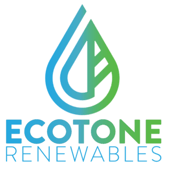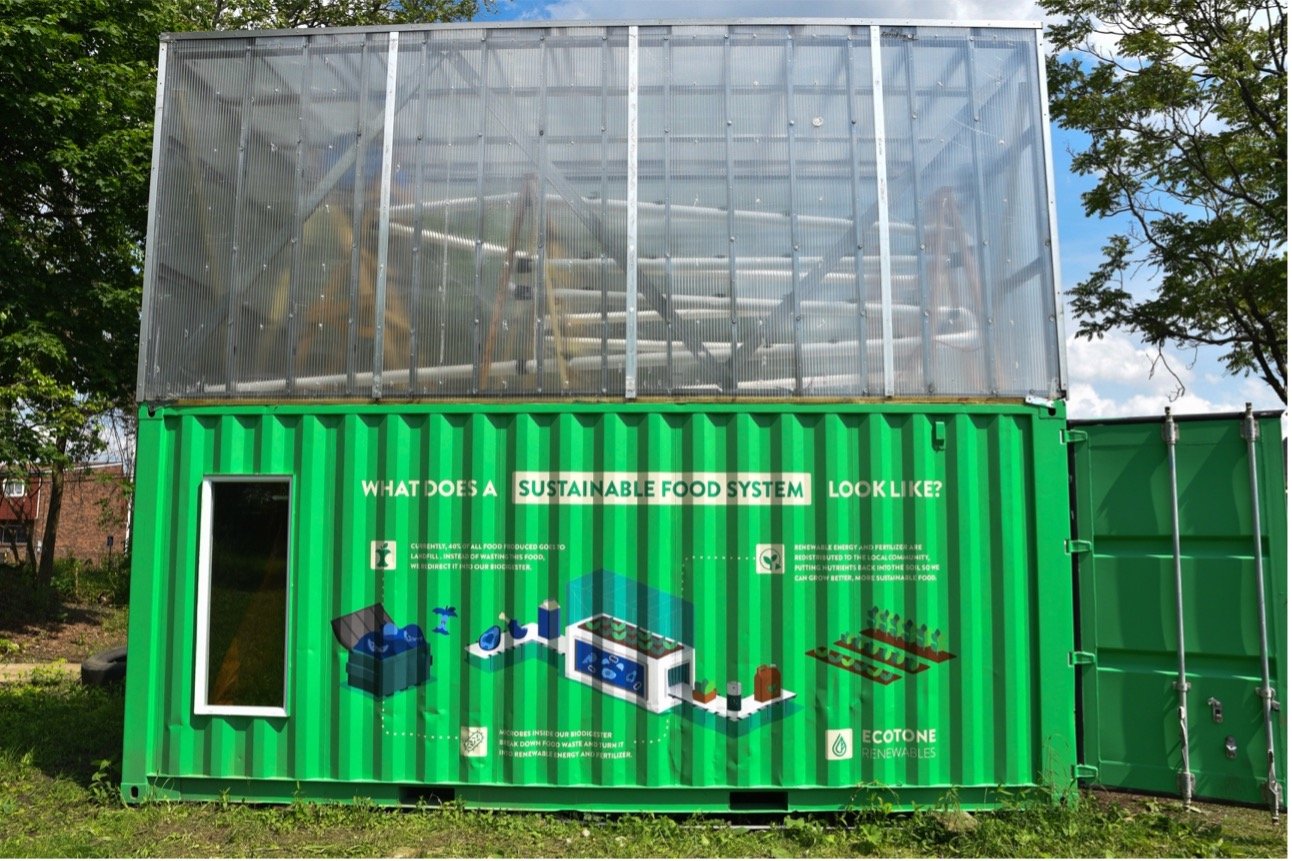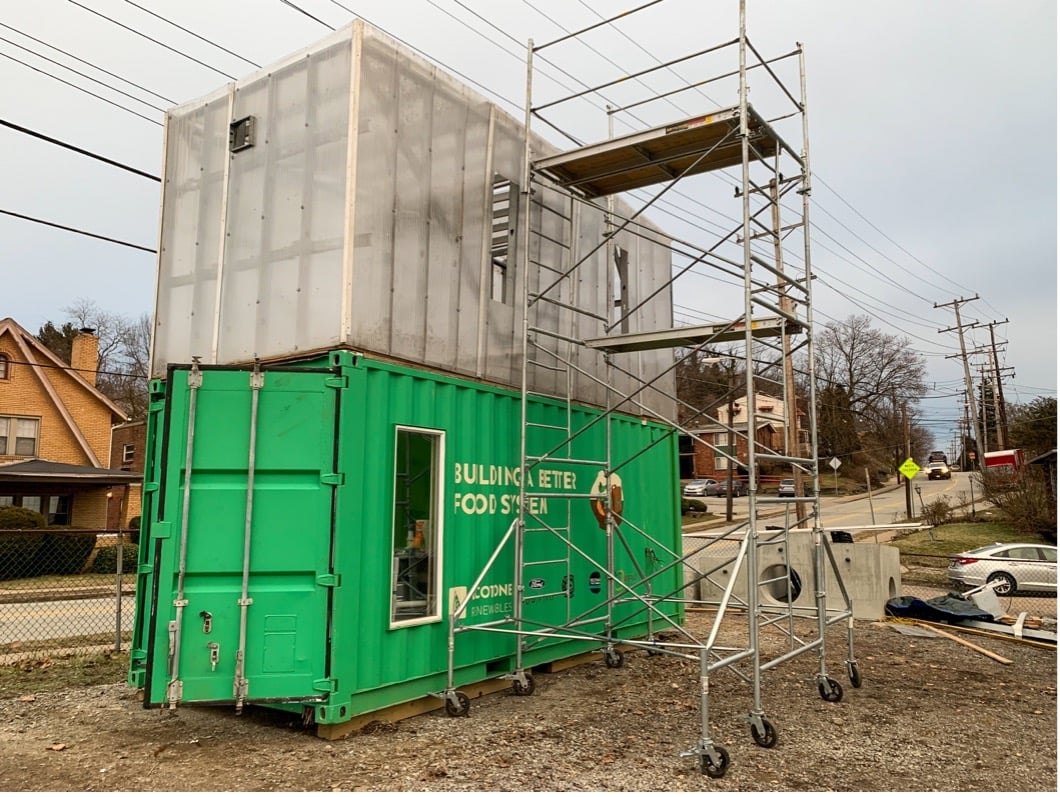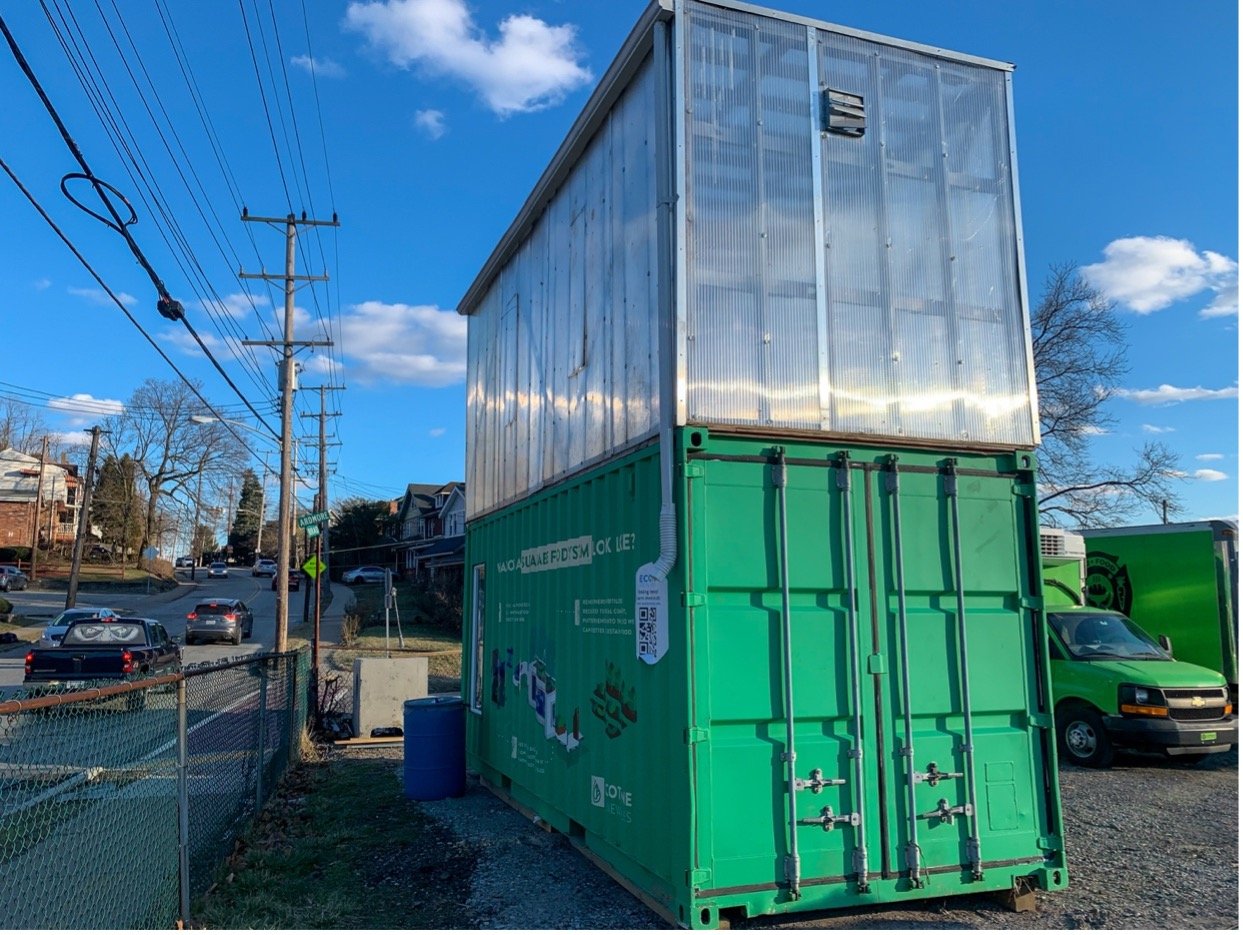
Ecotone Renewables is closing the food-loop by recapturing lost nutrients and creating hyper-local energy production.
Our cultures, identities, social outings and lifestyles have a lot to do with the food we eat. We prepare food elegantly for restaurant goers, present food regularly on network tv shows, spend billions on the production and transportation of food from farm to plate, and strengthen community and family ties over a shared meal at dinner. With food being so ingrained in our social lives, we can sometimes forget about the main purpose of food: to sustain life. As this simple fact slips our minds, we find people holding gold, oil, data, or other assets at a greater valuable; thus, food is also one of the most wasted commodities on the planet.
In the United States alone, 40% of food is wasted annually and the majority of it is sent to landfills where it biodegrades. As this biodegradation process occurs, the methane gas released from the food goes on to contribute to about 8% of the global greenhouse gas emissions. Although methane gas is considered a trace gas, only making up about 0.00017% of the Earth’s atmosphere—in comparison CO2 makes up 0.04% of the atmospheric gas and O2 makes up 20.95%—it traps 4-fold the amount of heat as CO2; thus, contributing more to global warming.
 Figure 1: One of Ecotone Renewables' greenhouse containers (Photo courtesy of Kyle Wyche)
Figure 1: One of Ecotone Renewables' greenhouse containers (Photo courtesy of Kyle Wyche)
For centuries, planet Earth sustained the human population with natural resources like abundant food, land, fresh water, and timber, but now humans must learn to sustain these resources. No longer are our resources seen as abundant with the illusion that they’ll go on forever. Instead, we have disputes that occasionally escalate to wars over water, land, food, minerals, and oil as they become scarcer. Within this changing world, sustainable living is becoming more important economically, socially, and environmentally. It is important to understand how our resources are dispersed and repurposed rather than used and expelled as waste.
With a particular focus on food waste, the traditional lifespan of food went like this: it began at the farm, traveled to the shelf, was consumed by consumers, and then any leftover consumer food waste was transported to landfills. This method is linear and as I’ve mentioned before, contributes to increased levels of environmental damage. However, there are alternative methods to reduce food waste. My company Ecotone Renewables LLC, which consists of a team of five, is altering this linear path to a circular, no-waste system. Annually, we divert and upcycle food waste from the landfill pathway to produce renewable biogas and nutrient-dense liquid fertilizer. We believe in no-waste and realized that there was a more efficient way in recapturing lost revenue and nutrients from the original lifespan of food.
 Figure 2: Rebuilding a Ecotone Renewables' greenhouse container (Photo courtesy of Kyle Wyche)
Figure 2: Rebuilding a Ecotone Renewables' greenhouse container (Photo courtesy of Kyle Wyche)
Our operations reflect our no-waste mentality as well. We focus on repurposing 8’ x 10’ shipping containers to create residential food-processing systems. While our original system, housed in a 10’ x 20’ shipping container, has a greenhouse component attached to it, our greenhouses will now be an additional feature that customers can choose from. During the entirety of our one year of beta testing, our greenhouse was used (and will continue to be used) for researching the most effective means of hydroponic production of new food. Our goal is to provide these systems to communities around food deserts that can then convert their wasted food to the revenue-driving products of renewable energy and fertilizer.
As we plan to expand our operations, our focus is always on uplifting and supporting the communities we serve. Over the last couple of years, our operations have traveled through downtown Pittsburgh, East Liberty, and now Swissvale. Within each community we work to support their local agriculture initiatives through the periodic donation of fertilizer, our time, and our expertise on hydroponics. We have also built various partnerships with local non-profits and organizations such as 412 Food Rescue, Repair the World, East End Cooperative Ministry, Ford Motor Company, the David L. Lawrence Convention Center, and various restaurants. During our time in East Liberty, we provided system tours to over 200 individuals including high school and college students, local residents, professors and investors.
More recently, we’ve invested in the growth of our local college students through our Spring 2021 Internship opportunity and our upcoming Summer 2021 Internship program. As an intern, students can receive college-level credit to pursue their independent research projects, which will assist them in fulfilling their graduation requirements and providing them with hands-on experience. Since Anaerobic Digestion (AD), the process by which we convert food waste to energy, is still limitedly researched in the United States, our students have the huge opportunity to take liberty in their scope of research around this topic. This spring, we have 9 interns from Carnegie Mellon University as well as a nuclear researcher focusing on areas like the automation of data analysis, alternative purposes for the intermediates prior to the digestate and fertilizer output, connection between food input and fertilizer nutrient output, and the most efficient process for hydroponic plant growth. Following the conclusion of the Spring 2021 Internship program, our interns will have the choice to continue on their research projects during the summer as a Summer 2021 intern (along with our new applicants). So far, a few students from the University of Pittsburgh have already been accepted to our Summer 2021 Internship program. If you or someone you know is interested in applying for our Summer 2021 Internship program, please fill out our application at tinyurl.com/EcotoneSummer2021Internship.
 Figure 3: Ecotone Renewables' Swissvale location (Photo courtesy of Kyle Wyche)
Figure 3: Ecotone Renewables' Swissvale location (Photo courtesy of Kyle Wyche)
As the spring months approach and Ecotone Renewables settles into its new home in Swissvale, we are revamping our system for our spring launch date of March 27th (raincheck date is March 28th). On this day, we will be holding an in-person, socially distanced event for a select few, as well as a virtual Facebook event for our broad audience. For more information on this event please visit our Eventbrite at: https://tinyurl.com/EcotoneRenewables
For more information on Ecotone Renewables, please visit our website at www.ecotonerenewables.com or follow our progress on Facebook at @ecotonerenew and on Instagram at @ecotone.llc. For additional questions, please fill out our Get in Touch questionnaire on our website contact page or email me at kyle@ecotonerenewables.com.
 About Kyle:
About Kyle:
Kyle Wyche is currently the Chief Operating Officer at Ecotone Renewables and a 2019 alumnus of the University of Pittsburgh where he received a B.S in Ecology & Evolution and a minor in Chemistry. Throughout his time at Pitt, he gained experience with startup companies through working with the Big Idea Center and their entrepreneurs in residence. Kyle began college as an undecided student in the Dietrich School of Arts & Sciences and his advice for anyone starting out or currently in college is to explore all of your interests and take advantage of opportunities when they present themselves.